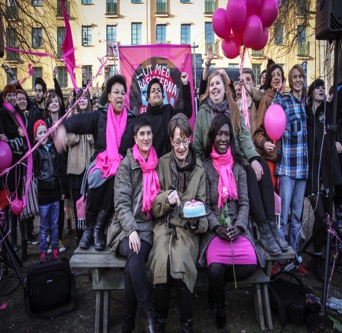The Feminism Initiative: Sweden’s Emerging Political Force
As of 2013, Sweden is ranked as the fourth most gender-egalitarian country in the world, behind only Iceland, Finland, and Norway. Sweden has one of the smallest gender pay gaps in the world, with women earning 94 percent of what men do when taking the profession and sector (public or private) into account. The country is famous for its generous policies, including more than 480 days of parental leave after a child’s birth or adoption, for both mothers and fathers. Within the workplace, women head more than 36 percent of companies. Women also hold 45 percent of the seats in the Swedish Parliament, more than five times as many women than in the United States’ Congress. Thus, Sweden is undoubtedly one of the best places in the world to be if you are a woman living in our modern-day world.
That being said, women in Sweden believe that more can be done within their country. As evidence, one need only look at the growth of Sweden’s Feminist Initiative in recent months. The political party, based on entirely on a platform of gender equality, started in Sweden but it has gained popularity throughout the Scandinavian region, most notably in Norway. Although the party has not yet won any seats in Parliament, it likely did not win seats due to the fact that it is primarily a single-issue party rather than because it favors gender equality. The party’s leaders have expressed that feminism is an ideal that can be applied to all sectors of politics, yet they have not provided much solid policy stances outside of women’s rights. What’s more important, however, is that the party has begun to make headlines worldwide in recent months, and even led women in other countries to desire their own feminist parties.
And yet, if Sweden and Norway are already so kind to women, at least relative to most other countries in the world, isn’t it strange that the women of these two countries felt the need to create the Feminist Initiative? One of the Norwegian Feminist Initiative’s leading politicians, Cathrine Linn Kristiansen, provides us with an answer. According to Kristiansen, women have “waited long enough for parties to get their act together [on feminist issues].” In other words, women in the region believe that the other parties are prioritizing other issues over complete gender equality, and want a political party focused entirely on the feminist cause so that Sweden and Norway do not move backward with regard to women and gender equality issues.
At the same time, why has this type of political movement not sprung up in other regions of the world? Most countries, even highly developed ones, have substantially larger pay gaps than Sweden’s six percent gap. Russia and South Korea have pay gaps of more than 35 percent and at home in the United States our pay gap is 17.8 percent. Moreover, women are not allowed to vote, work, drive, or get aneducation in several other countries around the world. There must be something that differentiates the women of the Scandinavian region from many other women around the world. It has nothing to do with the women themselves; rather, in many regions, it comes down to power and freedom.
Sweden’s women have a much larger amount of power and freedom than women in areas like the Middle East. Holding close to half of the seats in Parliament, women in Sweden actually do have the power to inspire change and create more feminist policies. Swedish women are also free from punishment that other women would face if they voiced their opinion about gender inequality. In the countries particularly unfriendly to the idea of women’s rights, women would need to seriously risk death or lengthy prison sentences in order to join a political party like the Feminist Initiative. Therefore, in this regard, Sweden is perhaps the perfect place to start a feminist political party.

